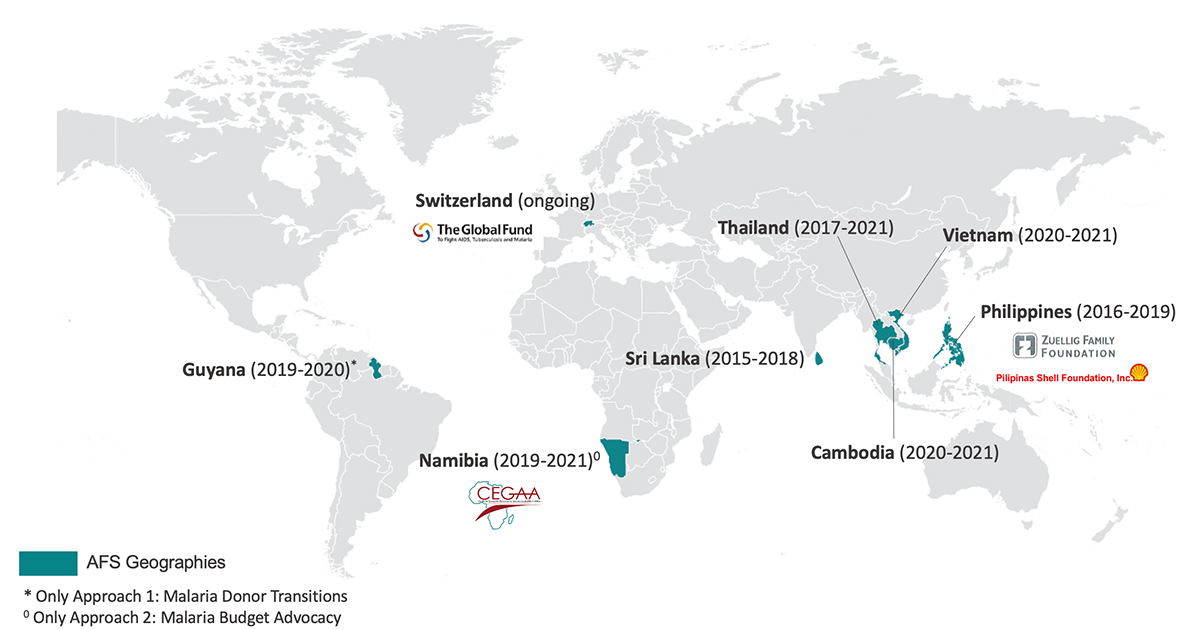Advocacy, Financing, and Sustainability
Country and subnational level: sustainability support
The MEI Sustainability Model
The MEI developed its Sustainability Model to support countries in securing a resilient and sustainable malaria response. A health system approach, including planning for integration and aligning incentives between a country’s malaria program and broader health reforms, is core to the MEI Sustainability Model at both the national and subnational levels.
The MEI Sustainability Model includes two complementary, country-level approaches—both implemented in partnership with national malaria programs, national and local governments, and their partners.
Health Systems Approach to Malaria Sustainability
Two complementary country-level approaches
Malaria Donor Transitions
Support country planning and action to transition to fully country-financed and managed programs.
Learn moreMalaria Budget Advocacy
Strengthen domestic financing for malaria through subnational leadership and advocacy.
Learn moreAim
Support countries in building a resilient and sustainable malaria response for successful elimination & prevention of re-establishment
The MEI supports a progressive, country-led approach to improve resilience—the ability of malaria programs to absorb and respond to unpredictable shocks—by preparing for and institutionalizing capacities to cope with, adjust to, and anticipate future threats. Sustainability of the malaria response is a critical enabler of resilience. The MEI partners with countries to strategically implement a malaria response, in line with epidemiological context, that will achieve and maintain elimination, even after donor funding ends.
Challenging Context
Innovations in technical approaches are changing the structure and focus of malaria programs. Additionally, future progress in malaria will likely require significant programmatic, political, and financial alignment with health system strengthening (HSS), universal health coverage (UHC), pandemic preparedness, and global health security.
For many national malaria programs:
- The future of donor funding is uncertain, and some countries are anticipating a decline or transition from donor funding.
- Preparation for reductions in or transition from donor financing may require:
- Quantifying how much is being spent domestically (e.g., at subnational levels);
- Identifying channels for domestic financing;
- Achieving efficiencies in the health system;
- Establishing local capacity, ownership, and leadership in leveraging resources;
- Further embedding components of the malaria response in the health system;
- Incorporating other sectors in support of malaria programs; and
- Evolving domestic resource mobilization efforts.
- The technical elements of the malaria response remain complex, requiring significant resources and/or doing more with less.
- A greater emphasis on targeting and tailoring of interventions requires a restructuring of malaria budgets and fostering local ownership and resourcing at the sub-national level.
- Decentralization and other health reforms may require a reorientation, including integration, of the malaria program within the health system.
Impact
The MEI has deployed its Sustainability Model approaches in seven countries, resulting in the mobilization of $2.5m in domestic resources in three countries, transitions strategies incorporated into national plans and funding requests in four countries, and significant gains in sustainability-related capacity at subnational levels as well as strengthened national governance, political will, and financing for malaria.
The MEI is available to provide direct country support on either Malaria Donor Transitions, Malaria Budget Advocacy, or both.
Regional and global level: Agenda-setting and policy influence
The MEI’s direct country support on sustainability is complemented by our partnerships with regional platforms and partners to promote best practices on transition preparedness and domestic financing. The MEI also engages global partners and donors, including the Global Fund, to ensure policy and practice evolve to align with country-level priorities.
The MEI has been a long-standing malaria advocacy partner. Since 2007, the MEI has led efforts to redefine the goalpost in the fight against malaria—from adequately controlling the disease to progressive elimination to shrink the malaria map, and ultimately, eradicating malaria for good.
Through a variety of channels, the MEI has amplified country and regional experiences in malaria elimination to advocate for a more ambitious approach to the fight against the disease. The malaria and global health community has now broadly accepted that malaria elimination is both a feasible and worthwhile goal, and many global health leaders believe that eradication is ambitious, achievable, and necessary within a generation.
The MEI continues its advocacy work to:
- equip donors with evidence to make effective malaria investments
- promote links between research, policy, and practice
- amplify the value of regional approaches
- support country-level efforts to adopt evidence-based policies to enable effective, efficient malaria responses
The MEI has a track record of generating robust economic and financing evidence for global, regional, and country partners. This body of work has included researching the costs and benefits of elimination, developing national and regional investment cases for elimination, monitoring financing for elimination by tracking donor and domestic funding sources in eliminating countries, and analyzing and influencing policy implications on financing.
